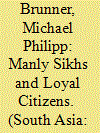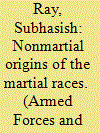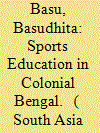| Srl | Item |
| 1 |
ID:
157869


|
|
|
|
|
| Summary/Abstract |
This article looks at Khalsa College, the first college specifically aimed at the Sikh community in late colonial India, and its schemes for and ideals of physical culture. Despite Sikh communal and Indian national aspirations, as well as a robust transnational discourse on ‘scientific’ physical culture that was being increasingly articulated in the inter-war period, Khalsa College remained remarkably devoted to ‘modernised’ physical exercise schemes focusing on British ‘manly games’ such as football, hockey and cricket. The essay locates the reasons behind the college management's staunch loyalty to Britain and opposition to newer, radical Sikh politics; its use of images of Sikh military traditions and ‘martial manliness’, often used to demarcate Sikhism from an ‘effeminate’ Hinduism; and its specific interest—shared by the colonial authorities—in keeping the students fit for military service.
|
|
|
|
|
|
|
|
|
|
|
|
|
|
|
|
| 2 |
ID:
121820


|
|
|
|
|
| Publication |
2013.
|
| Summary/Abstract |
Did colonial rule "construct" the "martial races" or do these groups have an innate cultural disposition toward military service? Despite the centrality of this question for evaluating different military manpower recruitment strategies in postcolonial settings, no study has subjected these hypotheses to systematic empirical testing. This article fills this gap using an original data set on the colonial status of 181 ethnic groups across twenty-nine ex-British colonies to examine the origins of colonial "martialness." The empirical analysis provides robust evidence in support of the constructivist argument.
|
|
|
|
|
|
|
|
|
|
|
|
|
|
|
|
| 3 |
ID:
161640


|
|
|
|
|
| Summary/Abstract |
Insufficient attention has been given to studies that relate sports, education and colonial policies in South Asia. Partly based on archival research, this article brings out different perspectives on the introduction of British sports into colonial Bengal as an educational device to produce obedient subjects. Several hegemonic and educational agenda intersected to formulate civilising ambitions. However, these turned out to be only partially successful, since the civilising aims of colonial sports education were constantly undercut by local acts of adaptation and modification. Dramatic evidence of Indians’ sports victories, in due course, severely challenged hegemonic agenda, so that strengthening and educating ‘the natives’ through sports turned out to be a double-edged sword. But this process also gave the Indian subcontinent a unique, exciting sports culture with nationalist colourings.
|
|
|
|
|
|
|
|
|
|
|
|
|
|
|
|